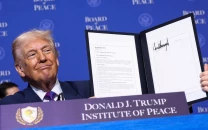Over 100 North Korean defectors missing after secret police detentions: Human Rights Group
TJWG's findings based on interviews with 62 North Korean escapees currently residing in South Korea
1730358345-0/BeFunk_§_]-(5)1730358345-0-640x480.webp)
A recent report from the Transitional Justice Working Group (TJWG) has brought to light the troubling situation of North Korean defectors, revealing that over 100 individuals have gone missing after being detained by the secret police while attempting to defect or communicate with relatives in South Korea.
This alarming information underscores the ongoing risks faced by those fleeing one of the world's most repressive regimes.
The TJWG's findings are based on interviews with 62 North Korean escapees currently residing in South Korea. The organization identified 113 individuals across 66 documented cases of enforced disappearances, many occurring since Kim Jong Un took power in 2011.
Notably, around 80% of these disappearances transpired within North Korea, while the rest occurred in neighboring countries like China and Russia.
The report indicates that nearly 40% of the individuals went missing while trying to escape, while others faced repercussions for their family members' actions or for maintaining contact with individuals in South Korea or abroad.
An especially alarming statistic is that more than 81% of those who disappeared had been transferred to the Ministry of State Security (MSS), North Korea's notorious secret police.
One interviewee from the border city of Hyesan recounted the story of a friend arrested by the MSS while trying to recover a hidden mobile phone, with rumors circulating that he had died in custody.
This illustrates the severe penalties imposed for any perceived communication with South Koreans, which is considered a serious offense by the regime.
Kang Jeong-hyun, director of the project, emphasized that the report aims to highlight the enforced disappearances as not merely national crimes but as transnational violations involving complicity from neighboring countries like China and Russia.
The report was released just days before the UN Human Rights Council is scheduled to conduct its five-yearly Universal Periodic Review of North Korea’s human rights record.
The UN estimates that up to 200,000 people are currently imprisoned in North Korea's extensive network of labor camps, many held for political reasons.
A 2014 UN Commission of Inquiry report detailed horrific conditions in these camps, including torture, forced labor, and systemic abuse.
The North Korean regime has long demonized defectors, labeling them as "human scum," and has increasingly tightened border security to prevent escapes, particularly as international scrutiny grows.
In the context of heightened global tensions, particularly due to the ongoing war in Ukraine, North Korea's actions have drawn additional concern.
Recent reports indicate that North Korea has deployed thousands of troops to Russia, raising alarms among US, South Korean, and Japanese officials about the potential for these forces to be used in the conflict against Ukraine.
The presence of around 12,000 North Korean soldiers, including high-ranking officers, has been confirmed, indicating a deepening military alliance between Moscow and Pyongyang.
This alliance is viewed as an expansion of security implications that stretch beyond Europe into the Indo-Pacific region, complicating an already volatile geopolitical landscape.
The TJWG's report highlights the urgent need for the international community to address the human rights abuses occurring in North Korea while simultaneously recognizing the complex web of alliances that may affect global stability.
As defectors continue to face dire risks, the focus on these issues becomes increasingly critical.
The regime's actions not only threaten the lives of those within its borders but also have ramifications for regional security, particularly in light of the North Korean troop presence in Russia and the broader implications of their involvement in international conflicts.
As the situation evolves, the plight of North Korean defectors remains a crucial concern for human rights advocates and policymakers worldwide.
The intersection of human rights violations and global military dynamics underscores the necessity for comprehensive strategies to address both the humanitarian and geopolitical challenges presented by North Korea's actions.



















COMMENTS
Comments are moderated and generally will be posted if they are on-topic and not abusive.
For more information, please see our Comments FAQ